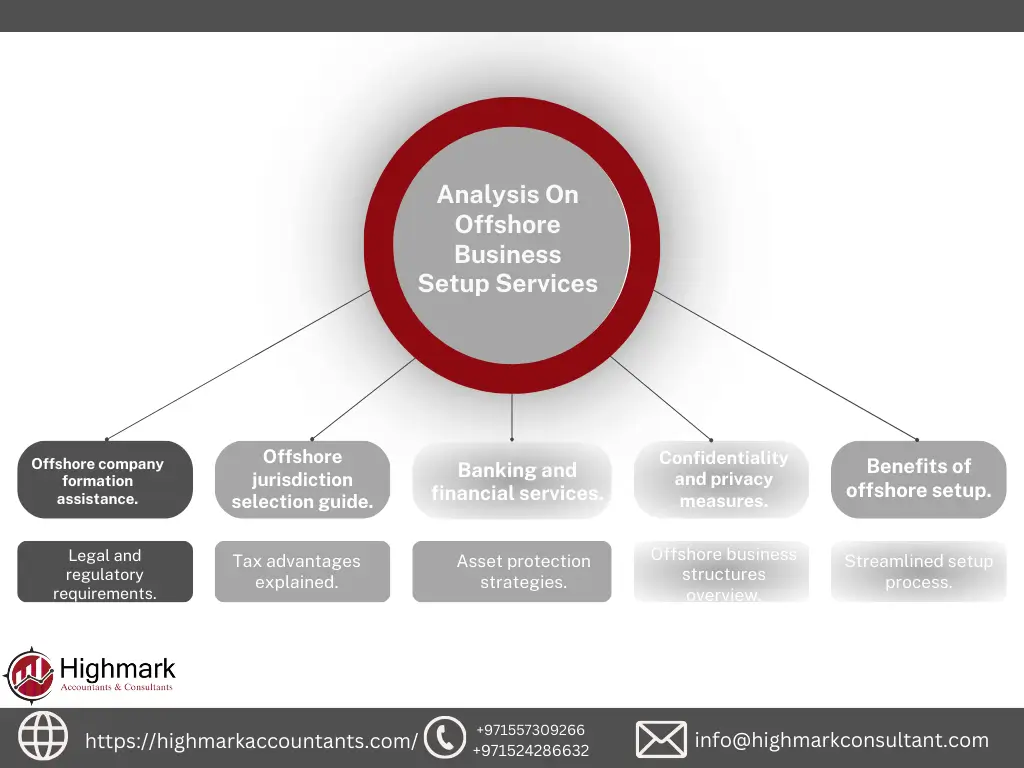Offshore Company Formations and Banking: Can You Establish Banking Without Travel?
Debunking Offshore Business Formations: Exactly How They Run and What to Anticipate
Offshore business formations can appear complex and enigmatic. Offshore Company Formations. These entities, typically developed for tax benefits and personal privacy, operate under unique legal frameworks. Business owners might locate themselves navigating via a labyrinth of guidelines and conformity demands. Understanding the intricacies is vital for success. What are the genuine benefits? What are the potential mistakes? A closer examination exposes the nuances that can influence decision-making significantly
Comprehending Offshore Business: Definitions and Kinds
Offshore firms are entities developed in a territory beyond a person's or organization's main nation of house, often for purposes connected to tax optimization, property protection, or regulative benefits. These companies can take various kinds, consisting of minimal responsibility firms (LLCs), international service firms (IBCs), and offshore trusts. Each type offers particular features and interest various demands.
Restricted liability business provide owners with protection from personal responsibility, while global business companies are prominent for their versatility and very little coverage needs. Offshore depends on, on the various other hand, are utilized mostly for estate planning and property defense.
The choice of territory substantially affects the business's procedures, as some locations provide much more favorable lawful structures and privacy securities. Offshore Company Formations. Recognizing the distinctions between these kinds is crucial for people and companies thinking about overseas structures, as each choice carries different effects for governance and compliance
The Advantages of Establishing an Offshore Company
Developing an overseas company can give various benefits, specifically for those seeking to improve their monetary techniques and secure their assets. One substantial advantage is tax optimization; numerous territories use desirable tax obligation rates or exceptions, allowing businesses to retain more profits. Additionally, offshore companies can give a layer of privacy, securing the identifications of owners and investors from public examination.
Another advantage is asset defense. By positioning possessions in an overseas entity, people can guard their riches from potential lawful insurance claims or political instability in their home nations. This structure also helps with international service procedures, allowing much easier accessibility to global markets and diverse customers.
Moreover, the facility of an overseas business can enhance reliability and reputation, attracting customers who value international service techniques. In general, these advantages make offshore business formations an attractive choice for companies and people going for monetary growth and protection.
Key Considerations Before Creating an Offshore Entity
Before developing an offshore entity, several critical variables need to be assessed. Legal conformity requirements, tax implications and benefits, as well as territory choice, play a considerable duty in the decision-making process. Comprehending these factors to consider can aid individuals and businesses browse the complexities of overseas business formations successfully.

Legal Conformity Demands
When taking into consideration the development of an offshore entity, comprehending legal compliance demands is essential to guarantee adherence to both regional and global legislations. Possible company owner have to familiarize themselves with laws regulating company registration, reporting obligations, and functional standards in the picked territory. This consists of validating the legal needs for shareholders and supervisors, as well as guaranteeing conformity with anti-money laundering (AML) and know-your-customer (KYC) laws. Additionally, services ought to continue to be knowledgeable about any kind of licensing requirements specific to their market. Involving regional lawful and economists can give valuable understandings, guaranteeing that all essential paperwork is prepared and submitted properly. Eventually, complete knowledge of lawful compliance helps alleviate dangers and promotes a lasting overseas operation.
Tax Obligation Effects and Advantages
Many local business owner take into consideration the tax ramifications and benefits of creating an offshore entity as a critical factor in their decision-making process. Offshore companies can provide substantial tax obligation benefits, such as lowered corporate tax rates, exception from particular neighborhood tax obligations, and the ability to delay taxes on international revenue. These advantages can result in boosted earnings and money flow, making offshore frameworks appealing for global service procedures. Additionally, the possibility for tax treaties might further minimize tax obligation obligations. It is vital for service owners to understand the intricacies entailed, including conformity with both international and regional tax obligation policies. Involving with tax experts is advisable to browse these details effectively and assure suitable tax preparation techniques.
Jurisdiction Option Variables
What elements should one consider when choosing a jurisdiction for overseas business formation? Secret considerations consist of tax effectiveness, regulative environment, and political stability. Territories with favorable tax regimes can greatly influence profitability. The regulatory landscape must offer flexibility and simplicity of compliance, enabling reliable business operations. Political security is essential, as it assures the security of properties and continuity of procedures. In addition, the reputation of the jurisdiction can affect customer depend on and business partnerships. Availability to banking services and the availability of professional support services are likewise important. Comprehending regional legislations pertaining to ownership, coverage, and privacy demands is necessary to determine that the overseas entity aligns with the service owner's goals and legal responsibilities.
Possession The Refine of Establishing an Offshore Firm
Establishing an overseas firm includes a series of tactical steps that need careful planning and conformity with international regulations. Initially, an individual need to pick a suitable jurisdiction that lines up with their organization purposes and supplies positive tax obligation benefits. Adhering to jurisdiction choice, the following action is to choose a special firm name and prepare the needed documentation, consisting of write-ups of consolidation and shareholder contracts.
When the documentation prepares, it needs to be submitted to the pertinent authorities together with the called for costs. After authorization, the business will receive a certification of incorporation, formally establishing its lawful existence. The individual should after that open up a business checking account to promote financial deals.
Maintaining an offshore company includes sticking to recurring conformity demands, such as yearly reporting and tax obligation responsibilities, which vary by jurisdiction. As a my sources result, comprehending each step is crucial for an effective overseas company formation.
Regulative and legal Framework for Offshore Companies
While developing an offshore company can provide considerable advantages, it is vital to maneuver via the complicated lawful and governing structure that regulates such entities. Each territory has its own set of legislations that dictate whatever from business formation to taxation and compliance demands. These regulations are designed to stop prohibited tasks, such as money laundering and tax evasion, and typically require extensive documents and openness.
Trick aspects of this framework include the need of selecting neighborhood directors, maintaining a registered workplace, and adhering to yearly reporting obligations. Additionally, numerous jurisdictions enforce details licensing demands for sure organization tasks. Understanding these lawful specifications is important for guaranteeing compliance and mitigating threats related to charges or legal conflicts. Consequently, involving with lawyers that specialize in overseas firms can help in maneuvering with this intricate landscape, eventually assisting in a successful and compliant overseas organization procedure.
Usual False Impressions About Offshore Business
Lots of individuals hold misunderstandings concerning overseas business, frequently equating them with tax evasion and unlawful activities. Nonetheless, it is necessary to identify that these entities can run lawfully within a structure designed for genuine organization practices. Making clear the legal status of overseas business can assist dispel these myths and advertise a more accurate understanding of their function.
Tax Obligation Evasion Myths
Despite the expanding appeal of offshore business, mistaken beliefs about their usage for tax evasion persist. Numerous people mistakenly think that developing an offshore entity is entirely a method to stay clear of taxes. Nevertheless, overseas companies are often utilized for genuine objectives, such as asset protection, global business expansion, and investment diversity. The assumption that all offshore activities correspond to immoral tax obligation evasion forgets the complexities of worldwide tax laws and compliance needs. Furthermore, the huge bulk of offshore territories have implemented actions to fight tax evasion, advertising transparency and info exchange. This mischaracterization can deter genuine businesses and investors from discovering the prospective benefits of offshore firm formations while bolstering a negative preconception surrounding these entities.
Legal Condition Clarified
The legal condition of offshore firms is often misconstrued, bring about a range of misunderstandings. Numerous think these entities operate in a legal gray area, thinking they are dishonest or naturally prohibited. In truth, overseas business are legitimate businesses created under the regulations of certain jurisdictions, made for numerous factors, including asset protection and market expansion. One more common misunderstanding is that offshore business evade taxes entirely; however, they go through the policies and tax obligations of their home countries. Furthermore, some people believe that offshore business can be easily manipulated for cash laundering or prohibited activities. While abuse can happen, most jurisdictions implement strict compliance and transparency laws to reduce such threats, making visit this website sure that offshore firms operate within legal structures.

Handling and Running Your Offshore Firm Successfully
Successfully taking care of and running an overseas company requires a critical approach that stabilizes compliance with regional laws and the pursuit of organization objectives. Successful offshore monitoring involves comprehending the territory's tax obligation laws, reporting needs, and functional laws. Utilizing regional specialists, such as accountants and lawful advisors, can give important insights right into going across these intricacies.
Furthermore, establishing clear communication networks and operational procedures is vital for maintaining effectiveness. Utilizing modern technology for project administration and partnership can improve performance, while normal efficiency examines assurance positioning with tactical purposes.
Maintaining durable financial records is important, as transparency cultivates depend on with stakeholders and complies with worldwide standards. Being versatile to adjustments in regulation or market problems enables overseas business to pivot properly, assuring long-lasting sustainability and development. By sticking to these concepts, local business owner can make the most of the advantages of their offshore endeavors while mitigating risks.
Regularly Asked Concerns
Just how Much Does It Cost to Keep an Offshore Business Each Year?
The expense to preserve an offshore company annually differs considerably, normally ranging from $1,000 to $5,000, depending upon jurisdiction, solutions needed, and conformity commitments. It is important to think about extra fees for certain requirements.
Can I Open Up a Savings Account for My Offshore Company From Another Location?
Opening up a bank account for an offshore firm remotely is normally feasible. However, requirements may differ by territory, frequently necessitating paperwork and verification processes, which can complicate the remote application experience for individuals.
Are There Certain Nations Recognized for Easier Offshore Company Formations?
Specific countries, such as Belize, Seychelles, and the British Virgin Islands, are renowned for their streamlined procedures and desirable regulations regarding offshore company formations, drawing in business owners seeking effectiveness and privacy in business operations.
What Kinds of Companies Are Ideal Matched for Offshore Business?
Particular organizations, such as consultancy, shopping, and investment firms, commonly take advantage of offshore firms because of tax advantages, privacy, and regulative versatility - Offshore Company Formations. These entities commonly grow in territories that promote beneficial organization atmospheres
Just How Can I Ensure Conformity With Neighborhood Regulations When Running Offshore?
To guarantee compliance with regional legislations when running offshore, it is necessary to involve lawful specialists, conduct extensive study on territory guidelines, and preserve transparent economic records, thus reducing threats related to non-compliance.
